2014新人教版八年级下册unit2-I'll-help-to-clean-up-the-city-parksSectionB2a-2e课件
2014年春八年级下册unit 2 I’ll help to clean up the city parks.Section B
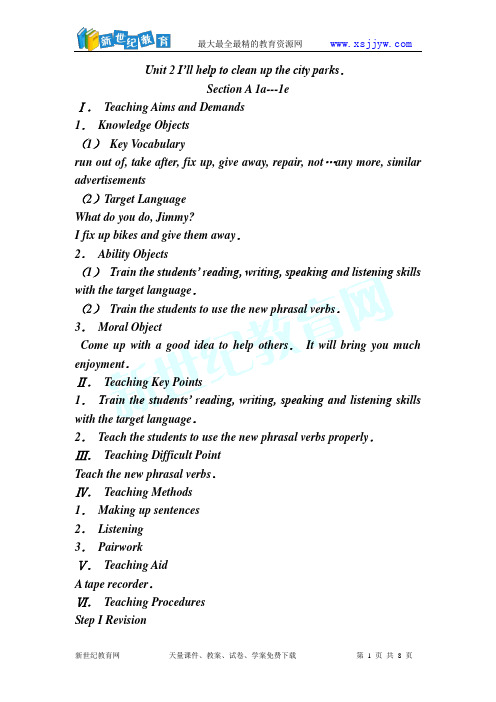
Unit 2 I’ll help to clean up the city parks.Section A 1a---1eⅠ.Teaching Aims and Demands1.Knowledge Objects(1)Key V ocabularyrun out of, take after, fix up, give away, repair, not…any more, similar advertisements(2)Target LanguageWhat do you do, Jimmy?I fix up bikes and give them away.2.Ability Objects(1)Train the students’ reading, writing, speaking and listening skills with the target language.(2)Train the students to use the new phrasal verbs.3.Moral ObjectCome up with a good idea to help others.It will bring you much enjoyment.Ⅱ.Teaching Key Points1.Train the students’ reading, writing, speaking and listening skills with the target language.2.Teach the students to use the new phrasal verbs properly.Ⅲ.Teaching Difficult PointTeach the new phrasal verbs.Ⅳ.Teaching Methods1.Making up sentences2.Listening3.PairworkⅤ.Teaching AidA tape recorder.Ⅵ.Teaching ProceduresStep I RevisionRevise the contents of Section A by asking some questions.Step Ⅱ1aThis activity introduces new target language.1.Read the instructions to the students.Make sure that each one knows what to do.2.Let the students look at the sentences in the left column first.Try to explain the four sentences in English for the students, especially the new phrasal verbs in the sentences.Say to them like this:Please look at the sentences on the left column.Let’s get the meanings of them.Let’s see the first one.(1).I’ve run out of itHere, run out of is a phrasal verb.It means reach an end of, use up or become short of.I’ve run out of it, means I’ve used it up, nothing left.Explain the other sentences in the same way like this.(2).I take after my mother.take after——be like sb.or be similar to sb.I take after my mother.——I am like my mother.(3).I fixed it up.fix up——install, fit together and place in position, repair, renewI fixed it up.——I installed it, or I repair it.(4).I gave it away.give away——make a present of, donateI gave it away.——I donated it.I gave it to someone without money.3.After explaining the sentences, read each sentence in the box and ask the students to repeat.4.Then ask several students to explain the sentences with letters in front of them.Tell them to explain them in their own sentences.For example, Sentence a, the student might respond.My bicycle was broken.I couldn’t ride it.I got new tires and a new seat.Now it works fine.5.Read the instructions again and ask the students to match the sentences with similar meanings.Say, Now match the numbered sentences with the lettered sentences in the box.Write the letter of one sentence in front of the number of the matching sentence.Look at the first sentence.The answer has been given.It’s Sentence b.Find out the answers to the other sentences.6.Check the answers by asking different students to read their matched sentences.Answers1.b 2.c 3.a 4.dStep Ⅲ1bThis activity provides writing practice with the new phrasal verbs.Call the students’ attention to the phrasal verbs in the box.Have four different students explain each phrases in their own words.Make sure each student knows the phrasal verbs’ meanings.Then ask the students to read the instructions together.Now let’s make sentences with the words in the box.Please look at the sample sentence in your book.Who would like to read it and explain it in your own language?Ask one student to read the sample sentence and explain it.He or she might explain like this:The meaning of this sentence is I give my bicycle to charities without money.Who can make another sentence with give away? Please put up your hands.Ask two or three students who have put up their hands to say their sentences to the class.Correct any mistakes they may make.Then have the students work individually.Make one sentence with each phrasal verb in the box.Tell them to write down their sentenceson the lines next to the box.Walk around the classroom as they write.Offer some help to them if they need.Try to remember who have made some wonderful sentences at the same time.After all of them have finished writing, choose some children who have made some wonderful sentences to share theirs with the class.Choose some of the best sentences.Write them on the blackboard.At last, ask the whole class to work in pairs and help each other.Let them check each other’s sentences very carefully.Correct all the mistakes in writing or sentence structures that their partners’ may have made.Sample answers:run out of: He is always running out of money before payday.take after: He takes after his father in everything but his nose.fix up: The workers: have fixed up the big machine.give away: The writer gave away his books to a library.Step Ⅵ1cThis activity provides listening practice using target language.Call the students’ attention t o the four pictures.Tell them the boy’s name is Jimmy.Read the instructions to the class.Your task is to number the pictures the correct order while you are listening to the conversation on the tape.But I want to ask you to guess the answer without listening now.Try to put the four pictures in a certain order to show a story of Jimmy by yourselves now.I’ll see whose answers ant correct after we finish doing the listening practice.Then have them give their own order by guessing.After a while, ask several ones to tell their answers to the whole class.Collect two or three answers which many students support on the blackboard.Next, ask some students to tell their own stories on the picturesaccording to their own orders.For example, if someone’s answe r is a.4 b.2 c.1 d.3.he or shemay tell a story like this:Jimmy got an old bike from someone.He fixed it up by himself.After he repaired it, he wanted to sell it to someone/he gave it away to someone.At last, he emptied both of his pockets.It seemed that he had run out of his money.The stories will vary.Ask them to work in pairs.Each one has to tell a story to the partner.After that, ask the students to get ready to listen.Say, We will hear a radio program.A man is interviewing a boy.Write a number in each short line next to each picture while you are listening.Your numbers should be from 1 through 4 and show which thing they talk about first, second, third and fourth.Play the recording the first time.Students only listen.Then play the recording again.Ask students to number the pictures.Check the answers.Remember to say congratulations to the children who guessed correctly.AnswersThe pictures should be numbered in the following order:a.4 b.2 c.1 d.3TapescriptMan:This morning I’m talking with a very generous young man, Jimmy the Bike boy.Jimmy is the boy who fixes up old bikes and gives them away.Good morning, Jimmy.Boy: Good morning.Man: So, Jimmy, tell our listeners what you do.Boy: Well, as you just said.I find or buy old bikes that nobody wants.Then I fix up the bikes and give them away to kids who don’t have enough money to buy their own bikes.Man: That’s fantastic.What gave you the idea?Boy: I guess I take after my father.He’s always helping people.Man: Wow! Your parents must be proud of you.Boy: I guess so.But now I’ve run out of money to buy old bikes.Man: Oh, that’s too had.Boy: Yeah.I need to come up with some way of getting money, or I’ll have to stop.Step Ⅴ1dThis activity provides listening practice using the target language.Read the instructions together with the children.Make sure that everyone knows what to do.Call the students’ attention to the box.Ask four students to read the four sentences to the class.Point to the list of statements and true/false choices.We will listen to the same recording again.Before I play the recording, let’s do like this.—If you can remember the contents of the conversation, please you’re your answers; if you can’t remember the contents, please just guess the answers.It doesn’t matter whether your answers are right or wrong.After a while, have the students get ready to listen.Play the recording again.Ask the students to circle the correct answer to each question—T for true or F for false.Check the answer.Remember to say congratulations to the students who had a good guess before listening.Answers1.T 2.F 3.F 4.TStep Ⅵ1eThis activity provides guide oral practice using the target language.First, play the recording of this lesson again,The students repeat after it.Let the students read after the tape at least twice.Tell them to try their best to copy the pronunciation of the recording.Read the instructions to the class.Tell them they will practice the conversation between Jimmy and the reporter, using the information in the Activities 1c and 1d.Ask a pair of the students to read the model conversation.S A:What do you do, Jimmy?S B: I fix up bikes and give them away.Write the conversation on the blackboard.Then let them practice their own conversations in pairs.As the pairs work together, more around the room offering help as needed.Ask several pairs to share their conversations with the class.Step ⅦSummarySay, In this class, we’ve learned how to use some new phrasal verbs first. And we’ve do ne much listening practice on the target language..At last, we did some oral practice by making our own conversations.Step ⅧHomework1.Make up one more sentence with each of the phrasal verbs in Activity lb.2.Write out the conversations that you made by yourselves in Activity 1e.。
2014新版人教版八年级下册Unit2-I'll-help-to-clean-up-the-city-parks知识点及检测练习题
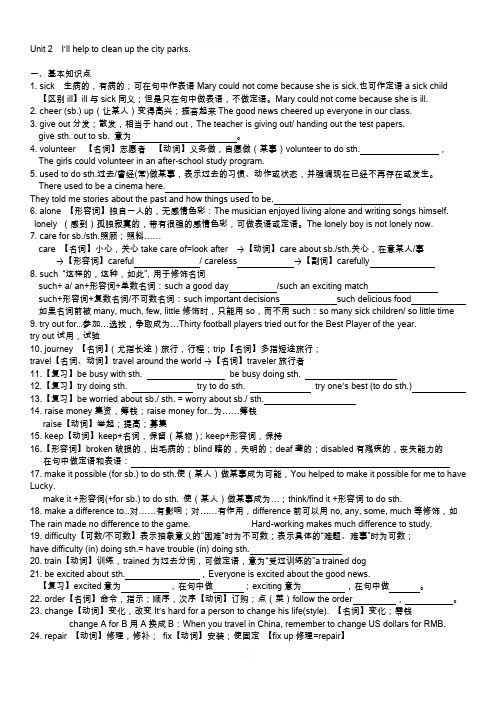
Unit 2 I’ll help to clean up the city parks.一、基本知识点1. sick 生病的,有病的;可在句中作表语Mary could not come because she is sick.也可作定语a sick child 【区别ill】ill与sick同义;但是只在句中做表语,不做定语。
Mary could not come because she is ill.2. cheer (sb.) up(让某人)变得高兴;振奋起来The good news cheered up everyone in our class.3. give out分发;散发,相当于hand out,The teacher is giving out/ handing out the test papers.give sth. out to sb. 意为。
4. volunteer 【名词】志愿者【动词】义务做,自愿做(某事)volunteer to do sth. ,The girls could volunteer in an after-school study program.5. used to do sth.过去/曾经(常)做某事,表示过去的习惯、动作或状态,并强调现在已经不再存在或发生。
There used to be a cinema here.They told me stories about the past and how things used to be.6. alone 【形容词】独自一人的,无感情色彩:The musician enjoyed living alone and writing songs himself. lonely (感到)孤独寂寞的,带有很强的感情色彩,可做表语或定语。
The lonely boy is not lonely now.7. care for sb./sth.照顾;照料……care 【名词】小心,关心take care of=look after →【动词】care about sb./sth.关心,在意某人/事→【形容词】careful / careless →【副词】carefully8. such “这样的,这种,如此”,用于修饰名词such+ a/ an+形容词+单数名词:such a good day /such an exciting matchsuch+形容词+复数名词/不可数名词:such important decisions such delicious food如果名词前被many, much, few, little修饰时,只能用so,而不用such:so many sick children/ so little time 9. try out for…参加…选拔,争取成为…Thirty football players tried out for the Best Player of the year.try out试用,试验10. journey 【名词】(尤指长途)旅行,行程;trip【名词】多指短途旅行;travel【名词、动词】travel around the world →【名词】traveler旅行者11.【复习】be busy with sth. be busy doing sth.12.【复习】try doing sth. try to do sth. try one’s best (to do sth.)13.【复习】be worried about sb./ sth. = worry about sb./ sth.14. raise money集资,筹钱;raise money for…为……筹钱raise【动词】举起;提高;募集15. keep【动词】keep+名词,保留(某物);keep+形容词,保持16.【形容词】broken破损的,出毛病的;blind瞎的,失明的;deaf聋的;disabled有残疾的,丧失能力的在句中做定语和表语:17. make it possible (for sb.) to do sth.使(某人)做某事成为可能,You helped to make it possible for me to have Lucky.make it +形容词(+for sb.) to do sth. 使(某人)做某事成为…;think/find it +形容词to do sth.18. make a difference to…对……有影响;对……有作用,difference前可以用no, any, some, much等修饰,如The rain made no difference to the game. Hard-working makes much difference to study.19. difficulty【可数/不可数】表示抽象意义的“困难”时为不可数;表示具体的“难题、难事”时为可数;have difficulty (in) doing sth.= have trouble (in) doing sth.20. train【动词】训练,trained为过去分词,可做定语,意为“受过训练的”a trained dog21. be excited about sth. ,Everyone is excited about the good news.【复习】excited意为,在句中做;exciting意为,在句中做。
2014年人教版新八年级英语下unit2《_i'll_help_to_clean_up_the_city_parks_》Section_A1a-4c
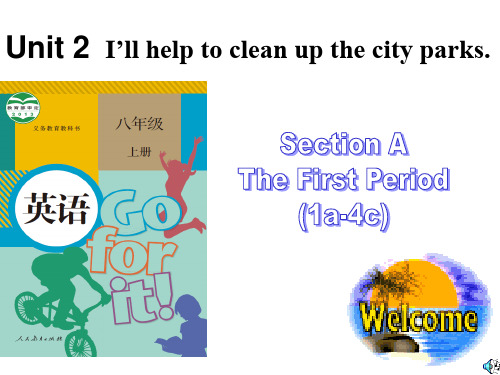
I hope to
work outside.
You could help to
clean up the city
parks.
2b Listen again. Fill in the blanks. up ____ come ___ with a plan to tell 1. We need to _____ people about the city park clean-up. 2. Clean-Up Day is only two weeks from now. We can’t ____ put ____ off making a plan. 3. We could _____ put ___ up signs. 4. Let’s make some notices, too. Then I’ll ____ them ___ hand out after school. up 10 students and 5. We could each ____ call ____ ask them to come.
1. Where’s Helen going to work this summer? _________________________________ She’s going to work in an old people’s _________________________________ home. 2. What did Tom do to help the old people?
___ 4 The girl could volunteer in an after-school study program to teach kids. ___ 1 The boy could help to clean up the city parks.
人教新目标八年级英语下册Unit2-I’ll-help-to-clean-up-the-city-parks-全单元知识点和练习
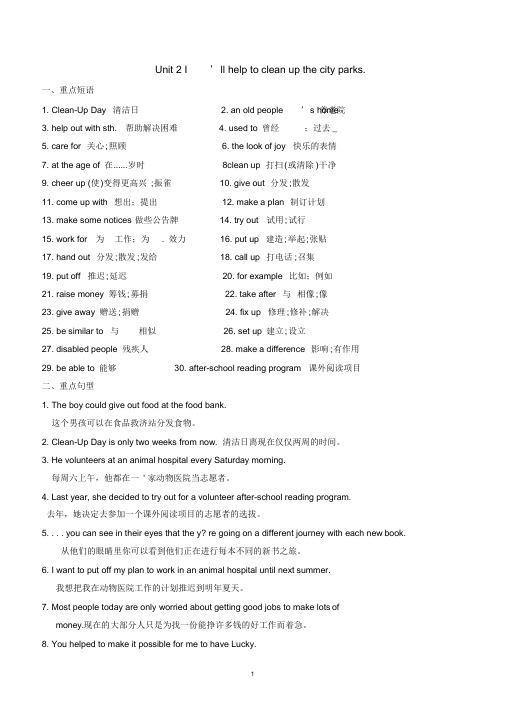
Unit 2 I ’ll help to clean up the city parks.一、重点短语1. Clean-Up Day 清洁日2. an old people ’s h养om老e院3. help out with sth. 帮助解决困难4. used to 曾经;过去_5. care for 关心; 照顾6. the look of joy 快乐的表情7. at the age of 在......岁时8clean up 打扫(或清除)干净9. cheer up (使)变得更高兴;振雀10. give out 分发;散发11. come up with 想出;提出12. make a plan 制订计划13. make some notices 做些公告牌14. try out 试用; 试行15. work for 为工作;为. 效力16. put up 建造; 举起; 张贴17. hand out 分发;散发;发给18. call up 打电话;召集19. put off 推迟; 延迟20. for example 比如;例如21. raise money 筹钱; 募捐22. take after 与相像;像23. give away 赠送; 捐赠24. fix up 修理;修补;解决25. be similar to 与相似26. set up 建立; 设立27. disabled people 残疾人28. make a difference 影响;有作用29. be able to 能够30. after-school reading program 课外阅读项目二、重点句型1. The boy could give out food at the food bank.这个男孩可以在食品救济站分发食物。
2. Clean-Up Day is only two weeks from now.清洁日离现在仅仅两周的时间。
人教版八年级下册英语 Unit 2 SectionB (2a-2e)
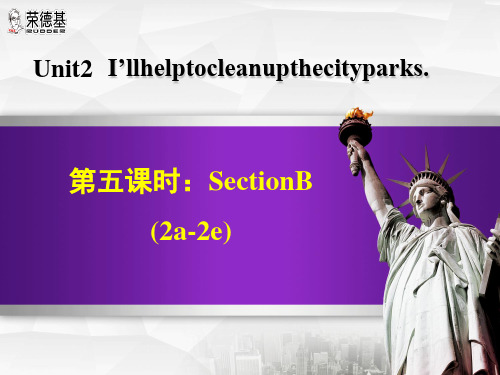
Bestwishes, BenSmith
2c
Lookatthelistofwordsbelow. Circlethepartofspeechofeachwordandmakeyourownse ntenceswiththesewords.
1.group(adj./n.) __S_h_e_s_in_g_s_i_n_a_r_o_ck__g_ro_u__p_. _____________ 2.disabled(adj./adv.) ______________________________
Animal
sent
Helpers
is
OBJECT unable to move
well. money to Animal
Helpers. animals like Lucky.
2e
Discussthequestionswithapartner.
1. Inwhatotherwaysdoyouthinkdogsareabletohelp people? 2. Whatotheranimalscanwetraintohelppeople?
“Lucky! Getmybook,”andhedoesitatonce. Luckyisafantasticdog. I'llsendyouaphotoofhimifyoulike, andIcouldshowyouhowhehelpsme. Thank youagainforchangingmylife.
6
Ican'tusemyarmsorlegswell, sonormalthingslikeansweringthetelephone, openingandclosingdoors, orcarryingthingsaredifficultforme. Thenonedaylastyear, 7afriendofminehelpedmeout. ShetalkedtoAnimalHelpersaboutgettingmeaspecialtraineddog.
2014春八年级下册Unit2-I’ll-help-to-clean-up-the-city-par
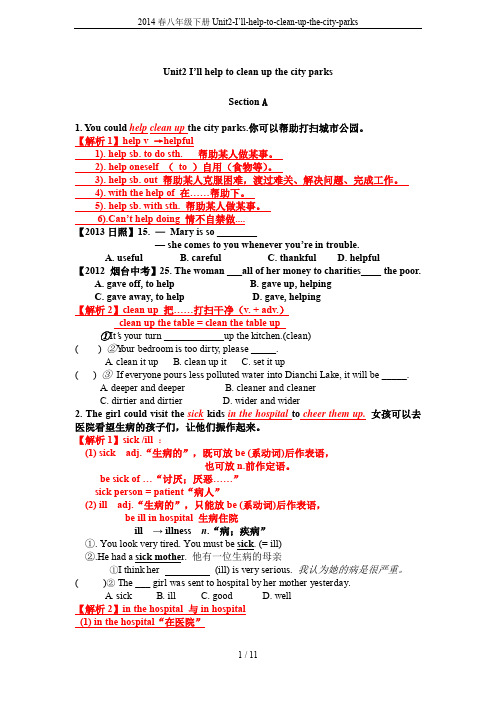
Unit2 I’ll help to clean up the city parksSection A1. You could help clean up the city parks.你可以帮助打扫城市公园。
【解析1】help v →helpful1). help sb. to do sth. 帮助某人做某事。
2). help oneself (to )自用(食物等)。
3). help sb. out 帮助某人克服困难,渡过难关、解决问题、完成工作。
4). with the help of 在……帮助下。
5). help sb. with sth. 帮助某人做某事。
6).Can’t help doing 情不自禁做....【2013日照】15. —Mary is so ________— she comes to you whenever you’re in trouble.A. usefulB. carefulC. thankfulD. helpful【2012 烟台中考】25. The woman ___all of her money to charities____ the poor.A. gave off, to helpB. gave up, helpingC. gave away, to helpD. gave, helping【解析2】clean up 把……打扫干净(v. + adv.)clean up the table = clean the table up①It’s your turn ____________up the kitchen.(clean)( ) ②Your bedroom is too dirty, please _____.A. clean it upB. clean up itC. set it up( ) ③If everyone pours less polluted water into Dianchi Lake, it will be _____.A. deeper and deeperB. cleaner and cleanerC. dirtier and dirtierD. wider and wider2. The girl could visit the sick kids in the hospital to cheer them up.女孩可以去医院看望生病的孩子们,让他们振作起来。
新人教版八年级英语下册unit 2 I'll help to clean up the city p
Unit 2
zxxk
I’ll clean up the city parks.
Section B Period 2
Reading (3a,3b: P64)
组卷网 zxxk
Phrasal verbs:
学.科.网
cheer up, run out of, put up, call
up, hand out, set up, come up with,
Fast reading II:
Who are trying to help Jimmy?
everyone : Reading strategy :
ቤተ መጻሕፍቲ ባይዱfriends
We can 学.科.网 take notes by
parents
looking for people in
teachers the passage.
3....and called up all his friends and told them about the problem.
problem:
组卷网
He did a radio interview. zxxk
He put up some signs.
He handed out advertisements.
学.科.网
He called up his friends.
组卷网
He told the teachers. He set up a call-in center for parents.
warm-hearted strangers
Careful reading I:
What did Jimmy do to deal with the problem? Reading strategy : Taking notes by looking for words about structure (also, then, even … ) words about actions (tell, put ,call …)
2014__新人教版八年级下英Unit2_I_'ll_help_to_clean_up_the_citsection B_部分
1c
Listen and number the pictures [1-4] in the correct order.
4
2
1
3
1d Listen again. Circle “T” (for true) or “F”
(for false).
1.Jimmy fixes up bicycles. T F
easygoing.
A. looks like B. takes after C. doesnt’ take after D. isn’t like I’m similar to her . 我和她很像。 【解析】similar adj. 相似的 be similar to sb. 和某人很相似
( ) ① Mary is very similar ____her sister in appearance.
7 .work out (结果、结果是) The idea works out well. 那个注意的实施结果很好。 另外还有“解答出、计算出”的意思。
Can you work out the answer to this question? See if you can work out this bill.
set up 建立;设立 set up =build建立(v. +adv)
【短语】:set off 出发
( )①The primary school _____in 1995 with the hope of young
people. A. was set up B. was put up C. was found ( ) ②We have ____ some organizations to help the poor students in the western areas of China.
人教版英语八年级下册Unit 2听力原文及翻译
Unit 2 I’ll help to clean up the city parks.Section A, 1bConversation 1Boy 1:I hope to work outside.我希望出外锻炼一下。
Girl 1:You could help to clean up the city parks.你可以帮忙清理城市的公园。
Conversation 2Boy 2:I’d like to help homeless people.我想帮助无家可归的人。
Girl 1:You could give out of food at the food bank to help feed them.你可以去食物赈济处分发食物来帮助供给他们。
Conversation 3Girl 2:I want to cheer up sick kids.我想为生病的孩子们鼓劲。
Girl 1:You could ask hospitals to let you visit the kids.你可以问医院让你探望孩子们。
Conversation 4Girl 1:I’d like to help kids with their schoolwork.我想帮助孩子们的课业。
Girl 2:You could volunteer in an after-school study program to teach kids.你可以在课后学习项目中自愿教孩子们。
Section A, 2a, 2bBoy 1:Now we need to come up with a plan to tell people about the city park clean-up.现在我们需要想出一个计划来告诉人们关于城市公园清理事宜。
Girl 1:Yeah, but I’m hungry, Bob. Let’s have lunch first.是啊,鲍勃,但我很饿。
2014人教版八年级英语下i will help to clean up the city parks课件
Phrasal verb cheer up
Sentence
set up
come up with
Meaning of phrasal verb He looks sad. make someone Let’s cheer him happier up. We’re going to establish , start set up a food bank to help hungry people. We need to think up come up with some ideas.
4 She could read by herself at the age of four. I could cook by独自地 myself (when I was ten) at the age of ten 在。。。岁 在时候.
5 Volunteering here is a dream come true for me. 在这里当志愿者对我来说是梦想成真。 I got the latest CD player as a birthday present yesterday. It was just a dream come true! 昨天我收到了最新的CD播放器作为一份生 日礼物,真是梦想成真了。
to be to learn to care
to look
to help
to do
put off call up
come up with
cheer up
put up
hand out
give out
to make
to do
to help
to spend
to visit
to move
